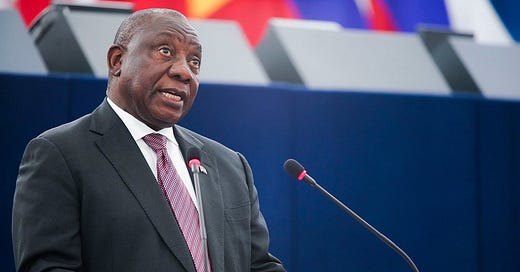🔅 The 'Farmgate' scandal
Today’s Issue: Glencore's $180m Congo bill, Tanzania cancels independence day celebrations, and mass sentencings in Chad... ☕
baobabnewsletter@substack.com
Photo of the day: Aerial shot of the Okavango River, Botswana

Markets
🔺 Nigerian SE: 48,366.69 (+0.20%)
🔻 Johannesburg SE: 74,623.48 (-0.09%)
🔻 Ghana SE: 2,460.62 (-0.11%)
🔺 Nairobi SE: 125.19 (+0.62%)
🔻 US S&P 500: 3,941.10 (-1.44%)
🔺 Shanghai Composite: 3,212.53 (+0.02%)
*Data accurate as of the close of markets across the continent
Democratic Republic of Congo: Glencore has agreed to pay $180 million to the Democratic Republic of Congo to settle bribery allegations from 2007 to 2018. This comes only months after it agreed to pay $1.5 billion to resolve corruption and market manipulation accusations in the US, UK, and Brazil. According to the US Justice Department, Glencore paid more than $100 million to intermediaries over ten years, with the intention that a portion of it would be used to bribe officials in Nigeria, Cameroon, Ivory Coast, Equatorial Guinea, Brazil, Venezuela and Congo. And if that wasn’t enough, last month, a British court ordered Glencore to pay more than $341 million for using bribes to boost its oil profits in five African countries.
POLITICS
The 'Farmgate' scandal

What happened?
We've held off on writing about ‘Farmgate’ as it played itself out, because the situation was more fluid than a Slip 'N Slide. To catch you up: South Africa's President Cyril Ramaphosa has been under fire for allegedly having a bunch (a lot) of cash at his farm and not reporting its theft.
Isn't it legal to keep your money at home though?
Yes, but the question is about how much money he was keeping, and how he got it. It was reported that he had $8 million with him at the house ($4 million, according to him), which he says he obtained from the sale of animals at the farm. The fact that he tried to cover up the theft made it all look very shady.
Because of this, he's been fighting off accusations by an independent panel and report that he broke anti-corruption laws. His critics wanted him impeached.
So what's happened since then?
A lot. First, the ANC's National Executive Committee met to discuss Ramaphosa's situation, and decided to tell its lawmakers to reject the report.
The ANC's decision wasn't unanimous, but it said it made it in the country's best interests. It was backed by investors, who are worried that if Ramaphosa steps down, it could lead to an increase in government spending and debt, and a worsening economic crisis.
Right after, Ramaphosa came out to ask the country's top court to throw out the independent panel's findings.
What now?
The saga raises questions about Ramaphosa’s early promises to fight graft when he came to power.
And although the opposition is trying to dissolve the National Assembly and call for an early election, analysts think that Ramaphosa will survive.
Indeed, the ANC has enough seats in parliament to block a vote by all opposition parties to begin impeachment proceedings. So, it looks like Ramaphosa's in the clear... for now.
ACROSS THE CONTINENT
Other Headlines

🇳🇬 The Abuja-Kaduna train service is back in business. After an eight-month hiatus due to a major abduction incident, the train has resumed operations. In March, gunmen blew up the tracks, shot and killed eight people, and kidnapped over 100 passengers. The hostages were released in batches following negotiations and ransoms paid to the captors. On Monday, the train departed Abuja around 10 am and was met with a third of its capacity filled with excited passengers. Military personnel and armoured tanks were on hand to ensure the safety of the passengers, who were grateful to have a reliable mode of transportation again.
🇹🇿 Tanzania’s President Samia Suluhu Hassan is making a statement with her latest move. Instead of celebrating the country’s 61st Independence Day with a fancy banquet and lots of pomp, she’s cancelled the festivities. She is using the $445,000 budget to build eight dormitories in primary schools for children with special needs. This isn’t the first time the country has cancelled Independence Day celebrations, either. In 2015, then-President John Magufuli diverted the budget to build a road in the commercial capital, Dar es Salaam. And in 2020, he used the budget to buy medical facilities.
🇹🇩 It’s been an intense few months in Chad, with a violent crackdown on anti-government protests in October resulting in the arrest of 401 people. Last week, those defendants were put on a mass trial at Koro Toro prison, a high-security jail located in the desert, and now the court has handed down its verdict. Out of the 401 people, 262 were given jail terms of two to three years, 80 were given suspended terms, and 59 were acquitted. The trial itself has been called “illegal” by defence lawyers, who boycotted the proceedings on the grounds that the defendants were “kidnapped” and “deported” far from the public gaze.
FOOD FOR THOUGHT
Proverb of the Day
“Affairs of the home should not be discussed in the public square.”
— Kenyan Proverb.




